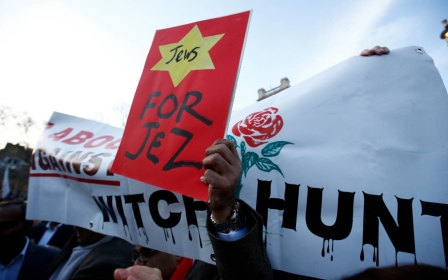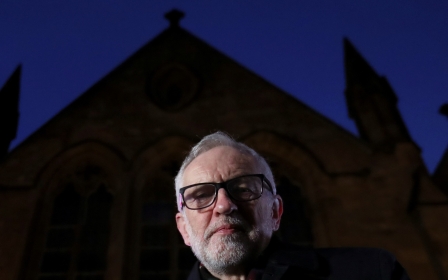Forde Inquiry: New date for findings on Labour's leaked antisemitism report

The Forde Inquiry, which is examining the UK Labour Party’s leaked report on antisemitism, has said that it hopes to publish its long-delayed report “by early autumn”.
But it says a parallel ongoing inquiry by the Information Commissioner’s Office “might still affect the scope” of its findings.
In a statement posted on its website on Monday, the Forde Inquiry Panel, which is chaired by Martin Forde QC, said it “has been unable to proceed with its work for a number of months now. This was due, in part, to the need to avoid any prejudice to work being done by the Information Commissioner… and in part due to logistical reasons beyond our control.” The statement did not explain what the logistical reasons were.
It added that “the Panel has now resumed its work, and will use its best endeavours to report by early autumn". It was originally scheduled to report in July 2020.
The latest statement from the Forde panel follows a Labour NEC meeting on 20 July, after which NEC member Nadia Jama tweeted that “GS [General Secretary – David Evans] advised he’d been in touch with Forde to agree for some elements of the report to be released by the autumn. …. We were advised that the only element of the report that won’t be available due to the ICO [Information Commissioner’s Office] investigation, relates to the leaking of the original report.”
Jama added that Forde would be invited to address the next NEC meeting, scheduled for early September, and that he would “provide a summary before publication”.
Forde report now more than one year late
The Forde Inquiry, which is independent, was set up on 1 May 2020 to look into Labour’s report on "The work of the Labour Party's Governance and Legal Unit in relation to antisemitism, 2014-2019".
The Labour report on antisemitism was drawn up during the last months of the leadership of Jeremy Corbyn. But it was leaked to the press in April 2020 after the party leadership, under Corbyn’s successor Keir Starmer, decided not to publish it.
The leaked report was widely dismissed by much of the media at the time as a whitewash. But the document, as MEE has reported previously, ran to 851 pages, drawing on tens of thousands of internal emails as well as three WhatsApp groups used by senior staff at party HQ. Its conclusions ran counter to the widespread media narrative at the time, which blamed Corbyn for allowing antisemitism in the party.
A number of the officials criticised in the leaked report subsequently appeared in the BBC Panorama programme 'Is Labour Anti-Semitic?' in July 2019, when they criticised Corbyn’s handling of antisemitism.
The Labour Party in turn criticised them, prompting seven officials, along with John Ware, the programme’s reporter, to take legal action against the party.
One of the first acts of Starmer's leadership was to settle the case out of court and pay damages. Corbyn said after the settlement that "our legal advice was that the party had a strong defence".
Should the Forde Inquiry, which has been beset by delays, vindicate the leaked report’s account of events, then it will be a major embarrassment for Starmer.
How Forde Inquiry changed focus
Originally the Forde Inquiry Panel was asked to investigate three areas, namely "the truth or otherwise of the main allegations in the Report"; “the background and circumstances in which the Report was commissioned, written and circulated… and the circumstances in which the report was put into the public domain"; and “the structure, culture and practices of the Labour Party”.
But last summer the Forde panel announced it was narrowing its remit and would “focus” its recommendations on the last of these, the most nebulous of the three areas of enquiry.
Initially the Labour Party supplied administrative staff to work with the panel, but they were withdrawn in August 2020 after the original 15 July deadline for it to report was missed. New staff were not appointed for another two months.
The panel then said it would report in early 2021. In February 2021, it announced that this report would now not be published until the Information Commissioner’s Office completed its own investigation, which focused on the leaking of personal data contained in the report than its wider contents.
But the website Skwawkbox subsequently reported that it had made a Freedom of Information request, which revealed that the ICO had not requested a delay and had had no communication with the Forde Inquiry.
The inquiry referred Skwawkbox to a letter it had sent to the NEC in February, in which it said that "there is a real risk that even partial disclosure of our report and findings could have the potential to prejudice the ICO’s work. As soon as its inquiries are completed, and resolved, we will provide a report."
On 10 May, the ICO told MEE that it had two ongoing investigations connected to the leaked report. The first began on 13 April 2020 - the day after the report was leaked. The second dates from 7 February 2021 - just four days before the delay to the report was announced. Both are ongoing.
There were also two further investigations begun by the ICO on 3 July and 23 September last year, which were concluded with no further action being taken. All four investigations were the result of self-referrals by the Labour Party itself, the ICO said.
MEE understands that there have also been tensions between the panel and the Labour Party about the cost of the inquiry. The Labour Party did not respond to a request by MEE for comment.
Middle East Eye propose une couverture et une analyse indépendantes et incomparables du Moyen-Orient, de l’Afrique du Nord et d’autres régions du monde. Pour en savoir plus sur la reprise de ce contenu et les frais qui s’appliquent, veuillez remplir ce formulaire [en anglais]. Pour en savoir plus sur MEE, cliquez ici [en anglais].




